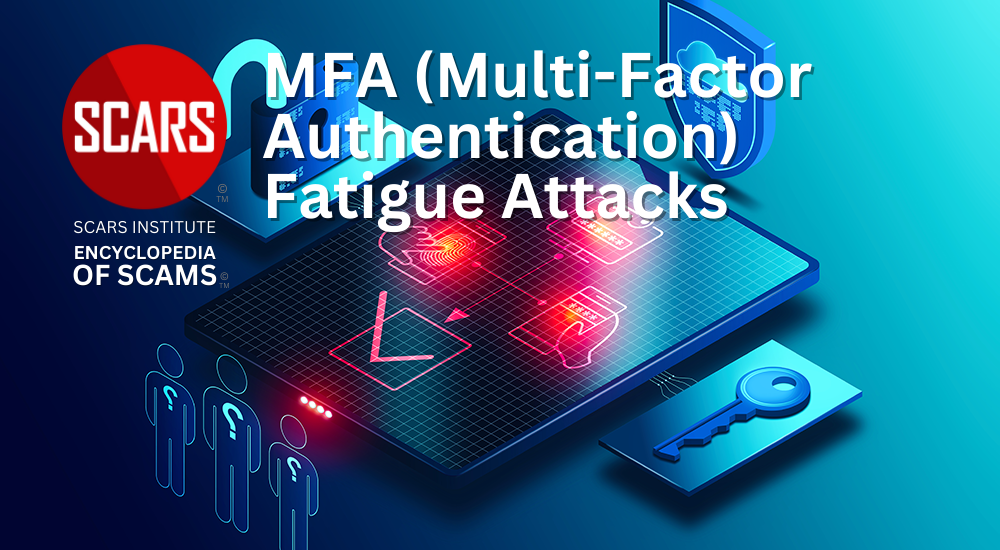
SCARS Institute’s Encyclopedia of Scams™ Published Continuously for 25 Years

MFA (Multi-Factor Authentication) Fatigue Attacks – 2024
A Cyberattack to Counter Multi-Factor Authentication
Catalog of Scams – A SCARS Institute Insight
Author:
• SCARS Institute Encyclopedia of Scams Editorial Team – Society of Citizens Against Relationship Scams Inc.
Article Abstract
An MFA fatigue attack is a cyber tactic where attackers bombard a victim’s device or account with repeated multi-factor authentication (MFA) push notifications until the victim becomes overwhelmed or annoyed.
The goal is to exhaust the target, eventually leading them to accidentally approve one of the authentication requests, thereby giving the attacker access to their account.

MFA (Multi-Factor Authentication) Fatigue Attacks are Increasing and People are Becoming Victims
Introduction
Multi-factor authentication (MFA) is a security method that requires users to provide more than one form of verification to access an account or application. MFA is an important way to protect online accounts and the data they contain, and it’s becoming more common as cyber threats increase.
An MFA fatigue attack is a method used by cybercriminals to exploit the human element of multi-factor authentication (MFA) systems. In these attacks, an attacker who has already obtained a user’s login credentials bombards the user’s device with continuous MFA push notifications, attempting to wear them down to the point where the user mistakenly or out of frustration approves the authentication request, thereby granting the attacker access to their account.
These attacks exploit the human element of MFA security. Instead of bypassing MFA through technical means, the attacker uses persistence, hoping the user will inadvertently approve the request, thinking it’s legitimate or simply to stop the flood of notifications. This type of attack often accompanies other social engineering methods, such as impersonating IT support to convince the victim that the notifications are legitimate.
This attack method has been used by groups like Scattered Spider and has proven effective against high-profile targets when traditional security defenses are in place
How MFA Fatigue Attacks Work
Here are the MFA Fatigue Attack steps:
- Credential Compromise: The attacker initially gains access to the victim’s username and password, usually through phishing or other social engineering tactics.
- MFA Bombardment: With credentials in hand, the attacker tries to log into the victim’s account. This triggers the MFA system to send repeated push notifications or prompts to the user’s mobile device or email.
- Exhausting the User: The attacker continues to send these authentication requests at frequent intervals. Over time, the victim may become overwhelmed, annoyed, or confused by the barrage of prompts.
- Unintentional Approval: The aim is for the user to accidentally approve one of the prompts, either out of confusion, frustration, or a mistaken belief that it’s legitimate. Once approved, the attacker gains full access to the account.
Examples of MFA Fatigue Attacks
- Uber Hack (2022): A high-profile MFA fatigue attack occurred during the Uber hack in 2022. The attacker obtained an employee’s login credentials and initiated an MFA fatigue attack by repeatedly sending push notifications to the employee’s phone. Eventually, the employee approved one of the authentication requests, allowing the attacker to breach Uber’s internal systems. The hacker then gained access to sensitive company information and openly taunted Uber’s security team.
- Okta Hack (2022): Another example involved Scattered Spider (LUCR-3), which targeted the identity provider Okta. Attackers used MFA fatigue to target an employee of a subcontractor to Okta. After a series of push notifications, the employee inadvertently granted access, allowing attackers to infiltrate Okta’s systems and later other client companies through the breached identity platform.
How to Prevent MFA Fatigue Attacks
- Educating Users: One of the most effective ways to prevent MFA fatigue attacks is through user awareness. Employees and individuals need to be educated about the dangers of approving unexpected MFA requests. If they receive repeated MFA prompts they did not initiate, they should report the incident to their IT or security team immediately.
- Time-based Lockouts: Organizations can configure MFA systems to temporarily lock accounts after a certain number of failed or rejected MFA attempts. This reduces the likelihood of an attacker successfully exploiting MFA fatigue.
- Phishing-resistant MFA: Using stronger forms of authentication, such as hardware-based security keys (like FIDO2 or YubiKey), can make it harder for attackers to bypass MFA by reducing reliance on push notifications or SMS codes.
- Additional Authentication Layers: Adding extra layers of security, such as biometric authentication or requiring contextual information (like location or device) to approve logins, can make it harder for attackers to succeed.
MFA fatigue attacks demonstrate how social engineering can bypass even robust security measures by exploiting human error and frustration. As attackers continue to evolve their techniques, organizations must combine technical controls with user training to mitigate the risks.
-/ 30 /-
What do you think about this?
Please share your thoughts in a comment below!
LEAVE A COMMENT?
Thank you for your comment. You may receive an email to follow up. We never share your data with marketers.
Recent Comments
On Other Articles
- on Love Bombing And How Romance Scam Victims Are Forced To Feel: “I was love bombed to the point that I would do just about anything for the scammer(s). I was told…” Feb 11, 14:24
- on Dani Daniels (Kira Lee Orsag): Another Scammer’s Favorite: “You provide a valuable service! I wish more people knew about it!” Feb 10, 15:05
- on Danielle Delaunay/Danielle Genevieve – Stolen Identity/Stolen Photos – Impersonation Victim UPDATED 2024: “We highly recommend that you simply turn away form the scam and scammers, and focus on the development of a…” Feb 4, 19:47
- on The Art Of Deception: The Fundamental Principals Of Successful Deceptions – 2024: “I experienced many of the deceptive tactics that romance scammers use. I was told various stories of hardship and why…” Feb 4, 15:27
- on Danielle Delaunay/Danielle Genevieve – Stolen Identity/Stolen Photos – Impersonation Victim UPDATED 2024: “Yes, I’m in that exact situation also. “Danielle” has seriously scammed me for 3 years now. “She” (he) doesn’t know…” Feb 4, 14:58
- on An Essay on Justice and Money Recovery – 2026: “you are so right I accidentally clicked on online justice I signed an agreement for 12k upfront but cd only…” Feb 3, 08:16
- on The SCARS Institute Top 50 Celebrity Impersonation Scams – 2025: “Quora has had visits from scammers pretending to be Keanu Reeves and Paul McCartney in 2025 and 2026.” Jan 27, 17:45
- on Scam Victims Should Limit Their Exposure To Scam News & Scammer Photos: “I used to look at scammers photos all the time; however, I don’t feel the need to do it anymore.…” Jan 26, 23:19
- on After A Scam, No One Can Tell You How You Will React: “This article was very informative, my scams happened 5 years ago; however, l do remember several of those emotions and/or…” Jan 23, 17:17
- on Situational Awareness and How Trauma Makes Scam Victims Less Safe – 2024: “I need to be more observant and I am practicing situational awareness. I’m saving this article to remind me of…” Jan 21, 22:55
ARTICLE META
Important Information for New Scam Victims
- Please visit www.ScamVictimsSupport.org – a SCARS Website for New Scam Victims & Sextortion Victims
- Enroll in FREE SCARS Scam Survivor’s School now at www.SCARSeducation.org
- Please visit www.ScamPsychology.org – to more fully understand the psychological concepts involved in scams and scam victim recovery
If you are looking for local trauma counselors please visit counseling.AgainstScams.org or join SCARS for our counseling/therapy benefit: membership.AgainstScams.org
If you need to speak with someone now, you can dial 988 or find phone numbers for crisis hotlines all around the world here: www.opencounseling.com/suicide-hotlines
A Note About Labeling!
We often use the term ‘scam victim’ in our articles, but this is a convenience to help those searching for information in search engines like Google. It is just a convenience and has no deeper meaning. If you have come through such an experience, YOU are a Survivor! It was not your fault. You are not alone! Axios!
A Question of Trust
At the SCARS Institute, we invite you to do your own research on the topics we speak about and publish, Our team investigates the subject being discussed, especially when it comes to understanding the scam victims-survivors experience. You can do Google searches but in many cases, you will have to wade through scientific papers and studies. However, remember that biases and perspectives matter and influence the outcome. Regardless, we encourage you to explore these topics as thoroughly as you can for your own awareness.
Statement About Victim Blaming
SCARS Institute articles examine different aspects of the scam victim experience, as well as those who may have been secondary victims. This work focuses on understanding victimization through the science of victimology, including common psychological and behavioral responses. The purpose is to help victims and survivors understand why these crimes occurred, reduce shame and self-blame, strengthen recovery programs and victim opportunities, and lower the risk of future victimization.
At times, these discussions may sound uncomfortable, overwhelming, or may be mistaken for blame. They are not. Scam victims are never blamed. Our goal is to explain the mechanisms of deception and the human responses that scammers exploit, and the processes that occur after the scam ends, so victims can better understand what happened to them and why it felt convincing at the time, and what the path looks like going forward.
Articles that address the psychology, neurology, physiology, and other characteristics of scams and the victim experience recognize that all people share cognitive and emotional traits that can be manipulated under the right conditions. These characteristics are not flaws. They are normal human functions that criminals deliberately exploit. Victims typically have little awareness of these mechanisms while a scam is unfolding and a very limited ability to control them. Awareness often comes only after the harm has occurred.
By explaining these processes, these articles help victims make sense of their experiences, understand common post-scam reactions, and identify ways to protect themselves moving forward. This knowledge supports recovery by replacing confusion and self-blame with clarity, context, and self-compassion.
Additional educational material on these topics is available at ScamPsychology.org – ScamsNOW.com and other SCARS Institute websites.
Psychology Disclaimer:
All articles about psychology and the human brain on this website are for information & education only
The information provided in this article is intended for educational and self-help purposes only and should not be construed as a substitute for professional therapy or counseling.
While any self-help techniques outlined herein may be beneficial for scam victims seeking to recover from their experience and move towards recovery, it is important to consult with a qualified mental health professional before initiating any course of action. Each individual’s experience and needs are unique, and what works for one person may not be suitable for another.
Additionally, any approach may not be appropriate for individuals with certain pre-existing mental health conditions or trauma histories. It is advisable to seek guidance from a licensed therapist or counselor who can provide personalized support, guidance, and treatment tailored to your specific needs.
If you are experiencing significant distress or emotional difficulties related to a scam or other traumatic event, please consult your doctor or mental health provider for appropriate care and support.
Also read our SCARS Institute Statement about Professional Care for Scam Victims – click here to go to our ScamsNOW.com website.
















Sempre achei invasivo deixar a minha localização em qualquer sítio ‘web’, mas pelos vistos é útil.